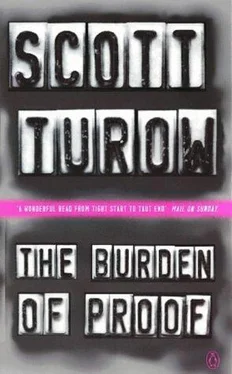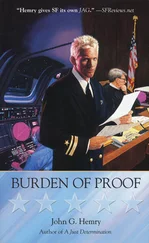Scott Turow - The Burden of Proof
Здесь есть возможность читать онлайн «Scott Turow - The Burden of Proof» весь текст электронной книги совершенно бесплатно (целиком полную версию без сокращений). В некоторых случаях можно слушать аудио, скачать через торрент в формате fb2 и присутствует краткое содержание. Жанр: Детектив, на английском языке. Описание произведения, (предисловие) а так же отзывы посетителей доступны на портале библиотеки ЛибКат.
- Название:The Burden of Proof
- Автор:
- Жанр:
- Год:неизвестен
- ISBN:нет данных
- Рейтинг книги:3 / 5. Голосов: 1
-
Избранное:Добавить в избранное
- Отзывы:
-
Ваша оценка:
- 60
- 1
- 2
- 3
- 4
- 5
The Burden of Proof: краткое содержание, описание и аннотация
Предлагаем к чтению аннотацию, описание, краткое содержание или предисловие (зависит от того, что написал сам автор книги «The Burden of Proof»). Если вы не нашли необходимую информацию о книге — напишите в комментариях, мы постараемся отыскать её.
The Burden of Proof — читать онлайн бесплатно полную книгу (весь текст) целиком
Ниже представлен текст книги, разбитый по страницам. Система сохранения места последней прочитанной страницы, позволяет с удобством читать онлайн бесплатно книгу «The Burden of Proof», без необходимости каждый раз заново искать на чём Вы остановились. Поставьте закладку, и сможете в любой момент перейти на страницу, на которой закончили чтение.
Интервал:
Закладка:
"Please," said Dixon. Once more, he looked around the room.
The weight of things had begun to settle on him. He was unhappy. "I don't want to fuck around with this."
Stern considered his brother-in-law with his manifold secrets. Clara's voice, as ever now, came into his mind.
Little as she cared for Dixon, she had never seemed surprised by their alliance. Stern had complained often that he did not know Dixon, was not sure he had ever gotten through to him, found the man at times as elusive as smoke.
'I imagine,' she had answered, 'that he says the same of you.
In the mock-Chippendale reception room of Barstow Zahn and Hanks,.a huge law firm, Stern sat with his children, awaiting Cal Hopkinson, with whom they had an appointment to learn the details of Clara's will.
Stern regarded this event with the same maelstrom of contradictory emotions that lingering concentration on Clara's wealth had always prompted, but for the moment most of that was lost in the strong feelingsregretful, fond, salutary-of having his children near at hand.
Tomorrow, Marta would leave. She had stayed a week following the funeral. Work was slow, she said, and Kate and she had planned to sift through Clara's things.
Irstead, Marta had spent hours alone, looking dreamily about her own room, poking through the house as if it were a new location. She had already mentioned that she would need to return soon to finish.
With the departure of Marta-the child who liked him best, or, more correctly, feared him least-Stern would be alone.
His children had offered him what comfort they could in the last weeks, but he felt them drawn away by the onrush of their lives and their plain bewilderment at having to deal with him on their own. With all the children, Clara had been his mediator; they had far less direct experience of him. Oh, he had cared. Deeply. But, in his compulsive orderly way, in its place. No matter how late he returned home from the office, in a routine as fixed as prayer, he received from Clara each night news of the children, the disturbances and triumphs, the unfolding of each small life. Somehow, at the time, he thought they would know that a portion of her interest was his own. When they reached their teens, he was baffled and stung as, one by one, they took up attitudes which silently accused him of being aloof, un-involved. The lines of attachment were to their mother. As in old-time law, he saw now, the benefits ran only to those in direct contact, in privity.
Cal appeared at last. He shook everybody's hand, precise as a clockmaker, and apologized for the wait. Cal was an unremarkable fellow-temperate, genial, a journeyman of sorts. The most impressive thing about him was a single physical feature: an inch or so behind his left ear, just below his hairline, was a round depression that darkened and appeared to head straight into his skull, as if someone had stuck a little finger into a ball of dough. The mark looked for all the world like a bullet hole-and that was what it was, a war wound from Korea, a medical marvel. The shot had passed straight through, with the only damage to Cal's outer skull. Once noticed, it was the kind of thing you could not keep your eyes off of. Stern spent his meetings with Cal awaiting the instant when he would turn away and Stern could stare freely.
Cal ushered the family toward a wainscoted conference room.
Stern was the last to enter, and Cal detained him at the door.
"Before we start, Sandy- As I told you on the phone last week, there's a question or two I wanted to ask you about Clara's estate some peculiarities I imagine you're aware of."
"Me?" Over the years, his commeme with Clara about her finances was limited to those rare occasions when she raised the subject, and usually he referred her to her bankers or attorneys.
They were interrupted by the arrival of Cal's associate, a young woman with spectacles and straight brown hair named Van Zandt. Marta poked her head out the door to see what the holdup was, and at Stern's suggestion they all proceeded into the conference room, where they were seated around the long walnut table. Little plate engravings, precious caricatures of various legal scenes, ringed the walls, and there was the usual majestic view of the city-the law finns and the corporate headquarters gobbled up all the best space. Harry Fagel had tried years ago to lure Stern 'into this modern Versailles, but he would have none of it.
"I think," said Cal, "I should just start at the beginning and tell you all about Clara's estate."
Stern nodded. Marta nodded. Everyone agreed this was appropriate. Van Zandt handed Cal a document-a memo, no doubt, summarizing the will-and Cal solemnly began. Like most sophisticated estate plans, Clara's had been composed with the first eye on the tax laws. As the result of her father's providence decades before, and careful advice,since, Clara had been able to dispose of a significant fortune without the payment of a single penny in federal estate tax. Cal disclosed this fact with a refulgent smile of minor triumph.
The great bulk of Clara's wealth had never been' transferred to her directly. Her inheritance from her father, mother, and maiden aunt had been placed in a series of trusts that Henry Mittlet had established at the River National Bank; these trusts would endure for generations, spilling out income and preserving corpus, in the venerated fashion of old money. When he was younger, Stern had believed that Henry had made these elaborate arrangements because he feared that his son-in-law was some kind of bounder. Now Stern knew that Henry's faith was simpler: any discretion, no matter how constrained, was liable to abuse. This brass-knuckled cynicism had made Henry a formidable attorney, although the same qualities of character also probably contributed to his daughter's lifetime discontent with him. Clara's fiercest internal struggles had been with her father, a clever, domineering, willful man.
Now Clara was interred in the synagogue's small cemetery, in the sight of the large monument that Henry Mittlet had erected to himself and Clara's mother, Pauline, by the terms of the same will that had created the trusts. The earth reclaimed them all, and their passions, while their bank accounts survived. Stern, never without an appreciation for money, nonetheless contemplated these sad facts with amazement.
"According to our notes," said Cal, "when we revised the estate plan after the most recent changes in the tax laws, the trusts were valued at a little over $7 million. Clara's own estate," he said, referring to the interest spun off to Clara by the trusts over the years which, largely unspent, had been invested for her by the bank, "was in the neighborhood of $2 million. Of course, there have been changes, with the stock market crash and other financial developments, but you have the general picture." Cal had taken his time getting to this point, and you could see that he enjoyed the effect the numbers had on his listeners. Kate's eyes widened and Peter whistled out loud. It was something of an achievement, Stern determined, to have kept the children in the dark about this. He himself was neither shocked by the figures nor far off in the estimates he had made on the way down today, or periodically over the years, concerning these dollars he had seldom deigned to touch.
Clara's will left simple directions. Stern was named executor. The rights to the trusts' income passed in equal divided portions to the children-"share and share alike," as Cal put it. Out of Clara's own fortune, a number of substantial gifts were made to the children and charities; the rest was left in trust for Stern to use as he saw fit.
Having outlined the will, Cal bored in on the details. As he described the provisions, he used the third person-"spouse Alejandro,"
"children Peter, Marta, and Kate" -and did not bother to translate many of the technical terms.
Читать дальшеИнтервал:
Закладка:
Похожие книги на «The Burden of Proof»
Представляем Вашему вниманию похожие книги на «The Burden of Proof» списком для выбора. Мы отобрали схожую по названию и смыслу литературу в надежде предоставить читателям больше вариантов отыскать новые, интересные, ещё непрочитанные произведения.
Обсуждение, отзывы о книге «The Burden of Proof» и просто собственные мнения читателей. Оставьте ваши комментарии, напишите, что Вы думаете о произведении, его смысле или главных героях. Укажите что конкретно понравилось, а что нет, и почему Вы так считаете.












